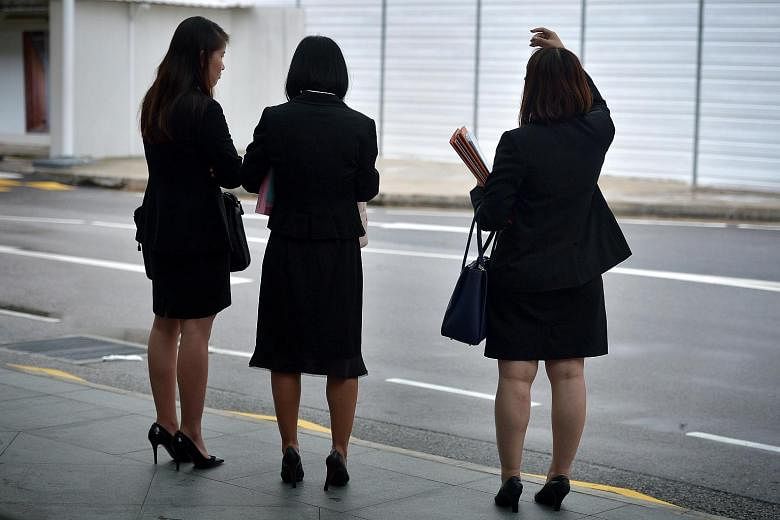You know the economy is slowing when insolvency, litigation and dispute work starts streaming in to law firms.
That is certainly the case at Big Four law firm Rajah & Tann, whose lawyers in these areas are the busiest at the company these days.
Mr Chia Kim Huat, Rajah & Tann's regional head of corporate and transactional practice, told The Straits Times: "While there may be a decline in some areas of corporate legal work, our insolvency, restructuring and litigation practice has been very busy.
"Due to the economic slowdown, contracting parties are finding excuses to delay or deny payment, especially for variation orders.
"We expect more disputes around this issue."
-
LEGAL SERVICES
-
Contribution to gross domestic product from the legal services sector in 2014: $2 billion (0.5%) Legal, accounting and management services employment in 2014: 114,200
Composition of sector: More than 870 firms, with more than 720 that have one to five lawyers, as of Aug 31 last year
SOURCES: SINGAPORE DEPARTMENT OF STATISTICS, MINISTRY OF MANPOWER, LAW SOCIETY
• Note: Data compiled from the Annual Survey of Services, which covers business entities registered with the Accounting and Corporate Regulatory Authority, but excludes own account workers such as freelancers. More than 99 per cent of the firms were small and medium-sized enterprises in 2014.
Law Society president Thio Shen Yi noted that the performance of the legal sector is closely connected to how the economy performs.
The lack of activity in real estate is certainly hurting firms, he said, but that is somewhat linked to the cooling measures. There is also less activity in the capital markets area, which involves initial public offerings and bank loans.
One Legal director Regina Quek concurred: "As a support industry, if the economy slows down, certain parts of our practice with higher correlation to economic growth will slow down in tandem as well. These areas will mainly be in the retail real estate, corporate finance and corporate loans."
Mr Thio, a senior counsel and joint managing director of TSMP Law, said: "It's always about opportunity. A market in crisis is highly dynamic. Merger and acquisition activity increases because valuations become more affordable and deals become more interesting."
He said restructuring and insolvency work did well last year. "As more companies restructure their debt and operations to manage their cashflow, you see a greater need for lawyers."
Construction-related disputes have been on the rise, "partly because we're in a cycle where a lot of projects have been completed, and there are disputes over who has to pay how much to whom", he added.
Mr Thio expects this area to do well in the next one to two years as such disputes tend to rise when the economy slows down.
Smaller legal firms also note more fund-raising and investment work.
Yuen Law managing director Samuel Yuen said the firm has achieved its highest turnover since 2012, and last year, and that the real estate practice experienced more than a 230 per cent increase in caseload.
Ms Koh C-u Pinn, director of Arielle Law Corporation which specialises primarily in corporate and intellectual property work, said the firm has seen a pick-up in acquisitions and investments such as funding for smaller companies and more inquiries from start-ups, small and medium-sized enterprises (SMEs) and individuals.
She added that there has been a sharp increase in queries regarding employment, for instance termination benefits, which could allude to more layoffs and a sign of the slowing economy.
Just like accounting, the legal industry remains resilient, and firms in niche areas will do well if they remain "nimble", said Mr Thio.
Mr Chia said having a diversified practice and overseas presence are a plus. He noted that Rajah & Tann's wide range of legal services and presence in nine markets across Asia "have helped us to keep an even keel amid the economic slowdown in Singapore and some countries in the region".
Mr Yuen says workplace policies, such as having flexible hours and setting up a remote access system that allows employees to work whenever and wherever they need, have also helped Yuen Law "retain the 'best fit' talents".
Mr Thio noted how some firms try to offer unique packages for certain services, but fees for areas such as litigation will still follow traditional models.
He said: "The overall trend when there is uncertainty or when the economy is not doing so well is that clients are more sensitive to price.
"Lawyers may have to share some pain with the clients. If there is greater downward fee pressure, then inevitably, revenue for law firms will also go down.
"We're seeing that we're running much harder and faster for the same dollar this year and even last year, compared with years before."
Rachael Boon

